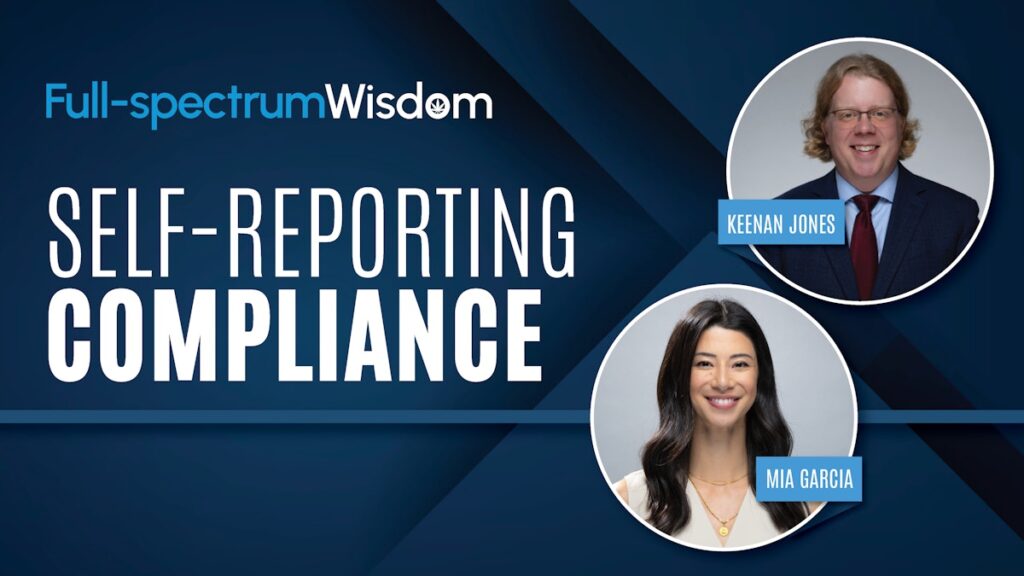Highlights;
- Self-reporting is crucial for cannabis operators to maintain trust and compliance.
- Report incidents promptly, even if details are unclear.
- Avoid underreporting or downplaying issues.
- Maintain detailed documentation of incidents and responses.
- Develop a clear incident response plan and train staff.
- Engage legal counsel early and be proactive with regulators.
In any business, attempting to cover up an issue often leads to more severe consequences than the issue itself. This is particularly true for cannabis operators, who face intense scrutiny and high expectations as part of one of the most regulated emerging industries in the U.S. While regulators have their own challenges in monitoring and enforcing compliance within each state, the responsibility largely falls on operators to maintain transparency and integrity.
To alleviate some of this burden, operators are required to establish robust internal controls, practice ethical governance, and report issues directly to regulators. Understanding when and how to self-report can make a significant difference in turning a manageable issue into a full-blown regulatory crisis.
Regulatory Requirement and Best Practice
Self-reporting involves voluntarily notifying a regulatory agency when a licensed business potentially violates regulations. Such violations could include inventory discrepancies, deviations from standard operating procedures (SOPs), security breaches, product contamination, theft, or employee misconduct.
While self-reporting may seem counterintuitive, especially if the issue can be resolved internally without risking employee, patient, or customer safety, it is a critical aspect of maintaining the integrity of the cannabis industry. Self-reporting is not just about limiting damage; it’s about building trust with regulators and the public, demonstrating accountability, and showcasing a commitment to compliance.
Common Mistakes to Avoid
-
Waiting Too Long to Report:
Delays in reporting can escalate issues. Most regulations require incidents to be reported within a tight timeframe, often 24-48 hours, depending on severity. Some cases, like theft or diversion, may even require immediate reporting. It’s better to report promptly, even with incomplete information, than to risk missing deadlines and facing additional penalties.Follow-up reports can be submitted later to provide more details, such as disciplinary actions, updated SOPs, or equipment changes. Failing to report on time can lead to license suspension, fines, and reputational damage.
-
Underreporting or Downplaying the Issue:
Be honest and transparent about the severity and scope of an incident. While it may be tempting to minimize the issue to avoid scrutiny, over-disclosure is safer. Regulators may uncover the full story through audits, investigations, or whistleblowers, leading to harsher consequences.Consider the nature of the incident: Is it an isolated event or part of a larger pattern? Could it have been avoided with better SOPs? Demonstrating proactive accountability shows a commitment to compliance. Concealment suggests systemic issues, which regulators take seriously.
-
Lack of Documentation:
Thorough documentation is key to learning from mistakes and preventing repeat incidents. Regulators expect detailed records of incidents, including timelines, investigations, corrective actions, employee interviews, and SOP revisions. Maintain a master record of all violations, fines, and administrative actions, as these may be needed for future license applications or ownership changes.
Recommended Actions
-
Develop a Clear Incident Response Plan:
Create a written procedure outlining what constitutes a reportable incident, how to document it, who is responsible for reporting, and applicable timelines. This will help your team identify and address issues quickly, protecting your license and enhancing your reputation. -
Train Your Team:
A strong policy is only effective if implemented correctly. Train all staff on procedures and emphasize the importance of compliance. Clearly communicate your state’s regulatory priorities, especially sensitive areas like advertising violations or patient confidentiality. Ensure employees are empowered to detect and report incidents.Common incidents of interest to regulators include product recalls, labeling errors, security breaches, and employee misconduct involving theft or diversion.
-
Consult Legal Counsel Early:
Engage legal and compliance experts to help create infrastructure for preventing incidents and assessing whether an incident is reportable. A knowledgeable attorney can guide the disclosure process, ensuring language in reports avoids unintended liability. Thoughtful communication and thorough documentation can mitigate risks.Maintain a positive relationship with regulators. Consistent and transparent interaction fosters trust, while inconsistent communication may raise concerns about compliance.
-
Prepare for Investigations and Penalties:
Self-reporting does not guarantee immunity from consequences. Conduct thorough internal investigations to demonstrate compliance commitment. Regulators may still investigate and impose penalties like fines or license suspension.However, self-reporting can reduce the severity of penalties. Failure to report can worsen consequences, even for minor incidents.
Final Thoughts
When in doubt, disclose. While self-reporting may not eliminate penalties, it often puts your business in a better position than hiding the issue. Transparency, accountability, and proactive compliance are essential for long-term success, especially in the cannabis industry, which continues to work toward legitimacy.


